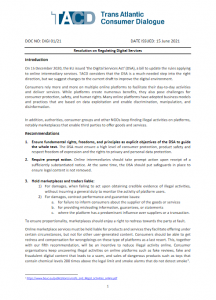Today, the Transatlantic Consumer Dialogue (TACD) publishes a policy resolution on regulating digital services. The resolution looks at the Digital Services Act (DSA) proposed by the European Commission on 15 December 2020. The aim of the DSA is to update the rules applying to online intermediary services. TACD considers that the DSA is a much-needed step into the right direction, but we suggest changes to the current draft to improve the digital environment.
The TACD is a forum of U.S. and EU consumer organisations which develops and agrees on joint consumer policy recommendations to the US government and European Union to promote the consumer interest in EU and US policy making.
The DSA updates and adds new obligations to the existing EU’s e-Commerce Directive, particularly for online platforms. Adopted back in 2000, the e-Commerce Directive is unable to cope with recurring problems consumers face on online markets.
Consumers rely more and more on multiple online platforms to facilitate their day-to-day activities and deliver services. While platforms create numerous benefits, they also pose challenges for consumer protection, safety, and human rights. Many online platforms have adopted business models and practices that are based on data exploitation and enable discrimination, manipulation, and disinformation.
With the above in mind, TACD formulates seven recommendations to the EU, supported by leading consumer and digital rights groups on both sides of the Atlantic – as similar debates are happening in the U.S., notably on the liability of marketplaces for the sale of dangerous and unsafe products and surveillance advertising – and both sides of the Atlantic want to tackle those problems.
Our recommendations
- Ensure the EU Charter’s fundamental rights, freedoms, and EU Charter principles are explicit objectives of the DSA to guide the whole text.
- Require prompt action from online intermediaries upon receipt of a sufficiently substantiated notice.
- Hold marketplaces and traders liable for the sale of illegal products and services under certain circumstances.
- Protect consumers from surveillance-based digital advertising and empower them to be in control of recommender systems.
- Oblige the largest online platforms to allow core service interoperability with users of competing providers of similar services. This could also be done under the Digital Markets Act.
- Require platforms to implement robust authentication of traders and verify the services and products they offer ahead of their making available online, while allowing for consumer anonymity.
- Put swift, effective, and efficient redress and enforcement mechanisms in place.
Resources
Further information can be found in the individual contributions of TACD members:
- The European Consumer Organisation (BEUC) position paper on the Digital Services Act proposal.
- European Digital Rights (EDRi) position paper on the EU Digital Services Act.
- Electronic Frontier Foundation (EFF) policy paper on the Digital Services Act.
